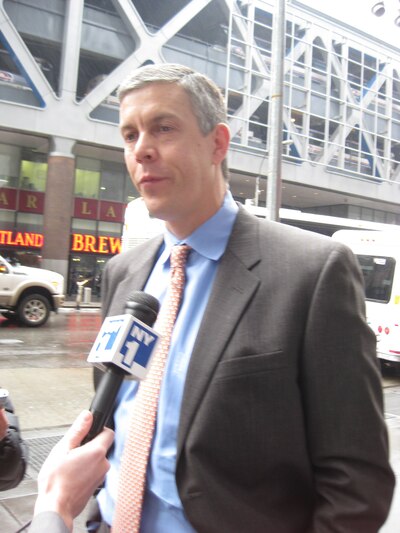
Just hours after Gov. Andrew Cuomo announced a deal about the structure of a new teacher evaluation system, U.S. Education Secretary Arne Duncan said he was no longer concerned about the state’s eligibility for federal Race to the Top funds.
New York won $700 million in Race to the Top funds in large part by agreeing to adopt a new teacher evaluation system. But after passing an evaluation law in the spring of 2010, implementation was slow, and relations between the state and its teachers union, NYSUT, had deteriorated over the implementation.
Last month, charging that the state was “backtracking on reform commitments,” Duncan warned that New York was at risk of losing its Race to the Top funds.
Today, Duncan said he was no longer worried. He struck a tone of unreserved optimism this afternoon while speaking to reporters on a Midtown sidewalk as he dashed between a meeting with the New York Times editorial board and a taping of the Daily Show.
“This was a major roadblock, a major stumbling block, and I think they are over that in a great way,” he said. There’s a whole body of work going forward that New York has to do, but this was a major issue, a major concern of ours and I think they’ve addressed it in an extraordinary way.”
Duncan praised the state’s collaboration with NYSUT.
“What you saw here was folks working together,” he said. “I think many people predicted this couldn’t work out, couldn’t happen, but this is union-imagined, working together to get the right points.”
Duncan rejected the idea that the state had taken too long to flesh out its evaluation system since applying for Race to the Top funds two years ago.
“We’re never looking for overnight successes,” he said. “What we are looking for is progress. What we are looking for is a willingness to challenge the status quo. If this was easy it would have happened many many years ago.”
Most of Duncan’s comments centered on the state-level evaluations deal, which created a framework for districts to agree to by the end of 2012. But he also noted Mayor Bloomberg’s decision to move forward with controversial “turnaround” plans at 33 struggling schools, even though the evaluations deal would appear to give New York City the flexibility to move away from the plan.
When teacher evaluation negotiations reached a standstill earlier this year, turnaround seemed to be the only model that would allow the city to continue to receive promised federal School Improvement Grants. But Bloomberg said today that the city would move forward with the turnaround plans anyway, even though that means the city would close those schools originally set to stay open under other, less stringent reform models.
Duncan said it is up to the city to decide which school reform method is best for each of the schools eligible for SIG funds.
“The turnaround method has already shown strong results in other states,” he said. “We have coming out soon some data on the first year those schools that are being turned around, and we are seeing some amazing success stories around the country: dropout rates going down, graduation rates going up, test scores increasing in the double digits.”
